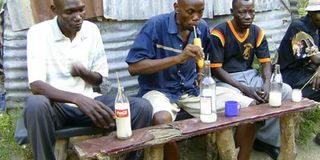Mnazi on its way to your favourite bar

Drinking mnazi. . FILE PHOTO | NATION MEDIA GROUP
Kwale County has legalised the traditional brew popularly known as mnazi (palm wine).
The milky natural drink is drawn from coconut trees and is common in the coastal counties of Kwale and Kilifi.
The county wants to collect more revenue from sellers of the drink who have been operating illegally without paying licence fees, said Kwale County Liquor Licencing Board Director Richard Onsongo.
“We have over 2,000 mnazi sellers in Kwale and this is a booming business. We believe if all of them pay their annual licences starting this November, then this is going to contribute to our county revenue,” he said.
Every seller will be required to pay a yearly licence fee of Sh10,000, amid other health safety requirements to be imposed by the public health department.
For instance, Mr Onsongo said, the drinking joints commonly known as “Mangwe” will be required to have running water and a functioning toilet.
This is because the drink is mainly sold in dingy places or on open grounds.
The joints must be located at least 400 metres from schools. They will only operate between 5pm and 11pm weekdays and 2pm and 11pm on weekends.
Liquor board
Mr Onsongo spoke in Ukunda when the liquor board met more than 300 bar and liquor traders, including local brew sellers to discuss the implementation of the 2020 Kwale County Liquor Management Act.
Its enforcement was suspended following the outbreak of the Covid-19 pandemic.
“For three years the county government has not been getting any revenue from the liquor businesses because the former governor had given the traders a reprieve owing to the coronavirus pandemic,” Mr Onsongo said.
“But this has now resumed as a county and we are looking forward to collecting more revenue.”
The county will ensure that the alcohol is not sold to children, said Cosmas Maina, a member of the liquor board.
This will include placing posters indicating that alcohol should not be sold to persons under 18 years old.
“We will put the posters and condom dispensers in these joints to ensure that there is no immorality or any children found in the areas," Mr Maina said.
He added that drugs and alcohol were already causing mental health problems among young people.
Msambweni police boss Francis Gachoki said they would support the traders on the condition that they are licensed, and the drinking joints will be watched to enforce law and order.
“If any seller does not meet the requirements stipulated in the Act, then they risk being arrested and their businesses being closed. They will also not be allowed to operate if not issued with a licence,” he said.
Sub-County Administrator Mwanakombo Omar singled out Msambweni as the area where the liquor thrives.
“We are hoping that this sub-county will generate more revenue than what was collected in the previous years when the mnazi business was illegal,” she said.
The move was welcomed by liquor traders, a majority of whom are women.
“We would be harassed by police officers most of the time and they would end up pouring the whole liquor. I believe that with the licences, my business will continue to grow so that I can continue to educate my children,” said Anna Mutisya, who has been in the business for eight years.
She explained that her business has helped her educate one of her children who finished high school and is now in university.
She said she had been arrested many times for selling the liquor but will now follow the regulations to avoid further arrests.
“I am very happy. Though the licence fee is high, I believe we can still pay it if the business goes well,” she said.




